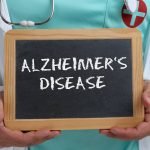Too much alcohol may make you forget where you parked the Porsche last night; but if you’re over the age of 75, a stiff one or two might actually enliven your memory enough to help you remember where you left your socks. So concludes a study out of the Central Institute of Mental Health in Mannheim, Germany1, where researchers followed 3202 elderly subjects for three years. At the outset of the study, none of the subjects showed signs of dementia. But by the end of the three years, 217 (6.8%) of the participants measured positive for dementia, with 111 (3.5%) of those having developed Alzheimer’s Disease. The researchers asked study participants about their daily drinking habits while assessing cognitive functioning at intervals of 1.5 years and then again at three years. Half of the participants didn’t drink at all, another 25 percent consumed less than one drink daily, 13 percent had up to two drinks every day, and the rest of the subjects (12 percent) enjoyed more than two alcoholic beverages a day.
The results showed that those participants who regularly drank alcohol had, overall, a 29 percent lower incidence of dementia and a 42 percent reduction in occurrence of Alzheimer’s compared to those who didn’t touch the stuff. The results also revealed that less isn’t necessarily more in this case. Those who drank two to three alcoholic beverages daily actually had a lower incidence of dementia than those who sipped just one. Surprisingly, it didn’t matter much whether the drink of choice was rosè or rum; wine and beer offered no advantage over the stronger stuff.
Lest the results spur you on to raid the liquor cabinet, note that the head of the research team, Dr. Siegfried Weyerer, issues this warning: “People should be aware that we are talking about mild/moderate consumption of alcohol. There is no doubt that long-term alcohol abuse is detrimental to memory function and can cause neuro-degenerative disease.” In fact, one study on binge drinking found that passing out from intoxication even once increases the risk of cognitive degeneration.2 Certainly, lots of evidence supports this cautionary note about heavy drinking. Even in the case of mild to moderate consumption, the results are mixed in terms of health effects. While some studies indicate that a drink or two may prolong life and protect the heart, others have found a link between drinking and various diseases, including cancer.
Nevertheless, at least 70 previous studies concluded that moderate alcohol intake does indeed seem to slow cognitive decline, and that’s a big plus on the side of drinking a bit. “Most studies show an association between light to moderate alcohol consumption and better cognitive function and reduced risk of dementia, including vascular dementia and Alzheimer dementia,” says the International Scientific Forum on Alcohol Research. One of the more dramatic studies found that once dementia sets in, having a daily drink can slow the rate of progression by 85 percent.3 Other studies have found that moderate drinking even in middle age confers some protective effect.
It seems rather counterintuitive that alcohol, which destroys the brain when consumed in large quantities, would preserve the brain when taken in smaller amounts. It sure gives new meaning to the term “getting pickled.” Some cite the antioxidants in wine as the reason for the effect, although the latest study found that even the hard stuff protects the brain, sans antioxidants, indicating that something else is at work. Others say that ethanol, a component of alcohol, triggers a brain chemical that improves memory. And then, there’s the theory that alcohol consumption raises HDL cholesterol levels, which improves heart health and thus circulation to the brain.
But many experts wonder if something other than physiology might skew the results. They say that those who drink may be in better health to begin with, because chances are good that they aren’t taking prescription medications that would interact with alcohol. They contend that those who drink may have a social circle to imbibe with, and having a social life benefits cognitive health. They also point out that those who enjoy a glass or two of wine daily may be doing so as part of a health regimen, trying to maximize antioxidant intake, and so they may lead a healthier lifestyle overall.
If booze isn’t your thing, alcohol isn’t the only option that may help you keep your senses into later life. In fact, there’s another liquid elixir that can lead you to the mental fountain-of-youth: coffee. As we’ve reported before, a Swedish study found that subjects who drank between three and five cups of coffee daily had a 65 percent reduced risk of developing dementia and Alzheimer’s later in life. In other words, coffee far outperforms wine, beer, vodka on the rocks and other alcoholic drinks as a dementia preventative. Even more, coffee not only reduces Alzheimer’s risk, but it actually has been shown to reverse the disease!
Hey, put two and two together, and does this mean we can expect Irish coffee to be the next hot drink of the retiring Baby Boomer set?
If you’re a dour purist who enjoys neither caffeine nor alcohol, you can relax because lifestyle factors such as eating well and exercising are at least as important as what you drink — probably more so. One study, for instance, found that working out just twice weekly in middle age cut the risk of dementia by more than half and the risk of Alzheimer’s disease by more than 60 percent.4 On the other hand, if you’re a hedonist who wants to stay sybaritic for years to come, you’ll be happy to know that both coffee and alcohol may well deserve a legitimate place in your regimen.
1 “Light to Moderate Alcohol Use Protective Against Dementia in Older Adults.” 7 March 2011. Medscape Today. 10 March 2011.<http://www.medscape.com/viewarticle/738563.>.
2 Nauert, Rick, PhD. “Binge Drinking Tied to Alzheimer’s Risk.” 11 January 2011. PsychCentral. 10 March 2011. <http://psychcentral.com/news/2011/01/11/binge-drinking-tied-to-alzheimers-risk/22489.html>.
3 Blue, Laura. “Does Alcohol Slow Dementia?” 21 May 2007. Time. 10 March 2011. http://www.time.com/time/health/article/0,8599,1623739,00.html.
4 “Twice-Weekly Workout in Middle Age Cuts Alzheimer’s Risk.” 05 October 2005. American Medical Network. 10 March 2011. http://www.health.am/ab/more/twice_weekly_workout_in_middle_age_cuts_alzheimers_risk.











this is something i'd
this is something i'd definitely read, lol!
completely idiotic. alcohol
completely idiotic. alcohol shouldnt be consumed, period.
Very good and enlighten
Very good and enlighten article.
Does this mean that you are
Does this mean that you are recommending coffee and alcohol consumption as part of your suggested health regimen? Does it fit in with the Lessons from the Miracle Doctors? I’m confused.
just gave up coffee a week ago,
Ontario
You’re just pulling our leg,
You’re just pulling our leg, aren’t you? The blog merely reports on the results of a study – and then lightheartedly suggests ways to get the same results for those who don’t want to drink coffee or alcohol. Just because a study conflicts with some of our preconceptions doesn’t mean we should ignore it. Far better to understand it, interpret it, and figure out ways to make use of the parts that fit our chosen lifestyles. Yes?